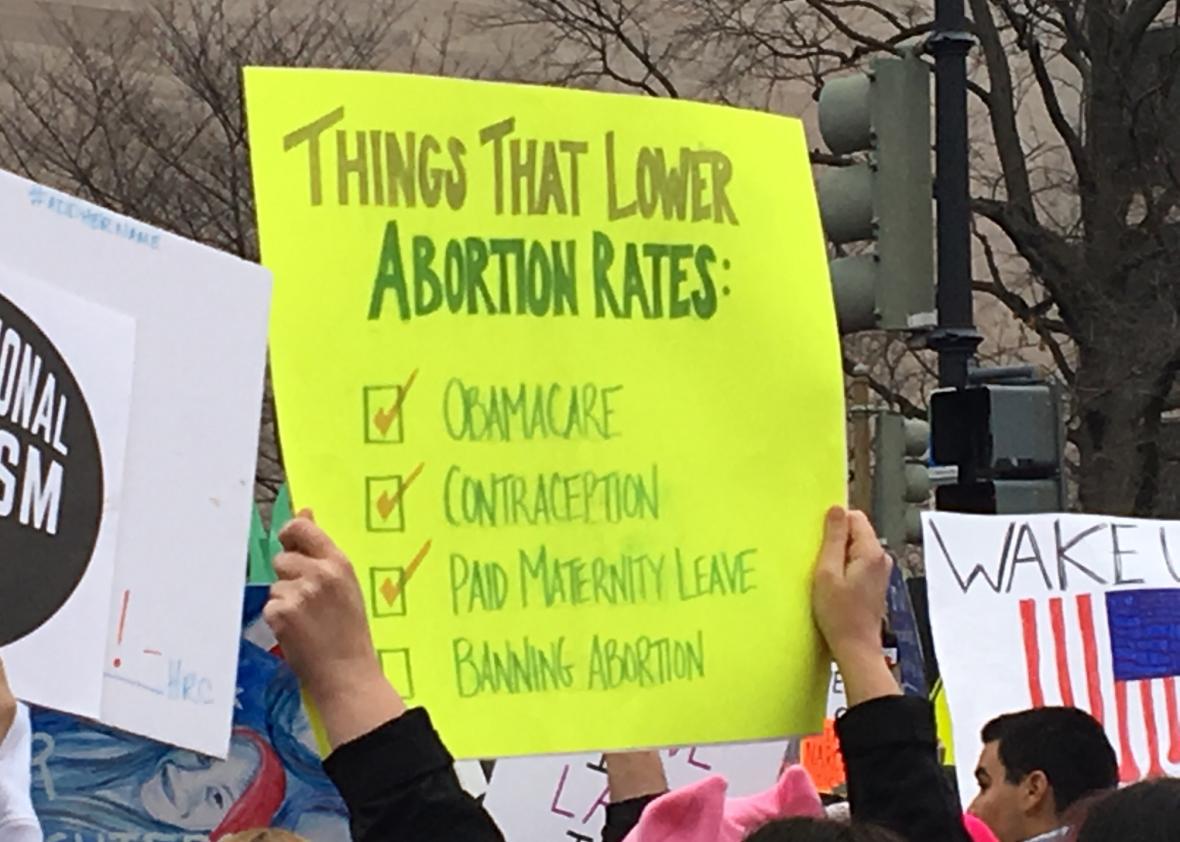In my comparative ethics course, I use abortion as a case study. We consider Christian arguments, Buddhist arguments—yes, Buddhism has historically seen abortion as tragic—and secular philosophical arguments against the morality of abortion. I think the question is far from settled, and the definition of life is debatable. I strongly believe that those who are pro-choice, myself included, need to acknowledge this and seek out challenging dialogue partners to discuss it further rather than take the superiority of our position as a given. Fertilized eggs may indeed deserve more protection than they are currently granted, because there’s a solid case to be made for understanding them as unborn children.
The truth is that I want to engage in dialogue with pro-life advocates, but there are some questions that make it difficult for me to do so—and I expect that many other pro-choice advocates have them as well.
Why, as I look out on the sea of signs at today’s the March for Life, do I see nothing about maternity leave, much less paternity leave? Why aren’t expansive parental leave policies front and center on every pro-life website, and on the lips of every pro-life politician?
Why does every speaker fail to mention contraception? Why isn’t sex education front and center on every pro-life website, and on the lips of every pro-life politician?
Why is adoption mentioned only in passing, if it is mentioned at all? As of this writing, MarchForLife.org’s “adoption” page still has “lorem ipsum” placeholder text. (Adoption was a focus of the 2014 march.*)

Screenshot
Why, if your movement “welcomes everyone,” as Ted Cruz and Cardinal Timothy Dolan both emphasized, do you focus so much on the Christian God? How do you expect to win over people like me if prayerful protest is more important to you than funding health services? (No. 1 on this website.)
To anyone looking in from the outside, the movement seems to be more about making public declarations of pious conservatism than advocating for life. It is, at heart, a religious movement, which explains the absence of contraception and sex education from the platform. It is also a politically conservative movement, which values small government more than the souls of unborn children and seeks to do little for them once they are born. In the (viral) words of Sister Joan Chittister:
I do not believe that just because you’re opposed to abortion, that that makes you pro-life. In fact, I think in many cases, your morality is deeply lacking if all you want is a child born but not a child fed, not a child educated, not a child housed. And why would I think that you don’t? Because you don’t want any tax money to go there. That’s not pro-life. That’s pro-birth. We need a much broader conversation on what the morality of pro-life is.
At the National Review, David French argues this angle is just a ploy to raise taxes and mocks those who share Chittister’s position. “The true concern,” he writes, “isn’t for child welfare but for transient notions of adult fulfillment, and no level of taxation will cure the selfishness of the human heart.”
But French is missing the point. The real argument is simply about the movement’s hypocrisy. If pro-life advocates genuinely saw saving unborn children as their top priority, then a significant number of them would also fight for a world in which all women and men can be confident that their children’s future will include education, food, and housing. Many would reject a political platform that cheers taxpayer funding of the military while simultaneously trying to cut health care funding—health care that might allow women to feel secure enough to bring a baby to term. And many would make contraception a central issue, instead of allowing religious prudery to take precedence over the unborn babies they are fighting for.
As with any large movement, there are exceptions to these generalizations—notably secular pro-life activists. But listening to the speeches at the March for Life earlier Friday and reading through pro-life websites, I have no doubt that overall they hold true. And so, as I watch pro-lifers shout about defunding Planned Parenthood without proposing practical alternatives, I cannot yet sympathize with their cause.
Instead, I think of Matthew 6:5, where Jesus condemns the hypocrites who “love to stand and pray in the synagogues and in the corners of the streets, that they may be seen.”
*Update, Jan. 30, 2017: This story has been updated to note that the march focused on adoption back in 2014.
